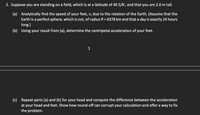Question

Transcribed Image Text:2. Suppose you are standing on a field, which is at a latitude of 40 5/6°, and that you are 2.0 m tall.
(a) Analytically find the speed of your feet, v, due to the rotation of the Earth. (Assume that the
Earth is a perfect sphere, which is not, of radius R = 6378 km and that a day is exactly 24 hours
long.)
(b) Using your result from (a), determine the centripetal acceleration of your feet.
1
(c) Repeat parts (a) and (b) for your head and compute the difference between the acceleration
at your head and feet. Show how round-off can corrupt your calculation and offer a way to fix
the problem.
Expert Solution
arrow_forward
Step 1 Introduction
Latitude gives your vertical angular position from the center, where the equator is . This angle also changed the forces you feel on Earth due to its rotation as well as gravity.
Centripetal acceleration is the acceleration that is pointed inwards in a circular motion. It is the force that keeps an object in circular motion as opposed to just flying off.
Trending nowThis is a popular solution!
Step by stepSolved in 2 steps

Knowledge Booster
Similar questions
- ) One of the moors of Jupiter, named an orbital radius of 10 4.22 * 10 ^ 8 a period of 1.77 days. Assuming the orbitis circular, calculate the inass of Jupiter. (b) largest moon of Jupiter, named Ganymede, has an orbital radius of 1.07 * 10 ^ 9 m a period of 7.16 daysCalculate the mass of Jupiter from this data ) your results to parts (b) consistent ? Yes No Explainarrow_forwardAlgebraic relation. Two particles, A and B, are in uniform circular motion about a common center. The acceleration of particle A is k times that of particle B and the speed of A is 3 times that of B. Find the numerical value of the ratio of their radii, A/B if [] k 9.4 B = 1.4 TA/TB = Please record your numerical answer below, assuming three significant figures.arrow_forwardRead the question carefully and give me right solution according to the question. A particle travels around a circular path having a radius of 40 m. If it is initially traveling with a speed of 10 m/s and its speed then increases at a rate of (0.05 v) m/s 2, determine the magnitude of the particle’s acceleration at t = 3 s. Round your answer to 2 decimal places.arrow_forward
- The days on Mars and Earth are of nearly identical length. Earth's mass is 9.35 times Mars's mass, Earth's radius is 1.88 times Mars's radius, and Mars is on average 1.52 times farther away from the Sun than Earth is. The Martian year is 1.88 times longer than Earth's year. Assume that they are both uniform spheres and that their orbits about the Sun are circles. Estimate the ratio (Earth to Mars) of the following. (a) their spin angular momenta(b) their spin kinetic energies(c) their orbital angular momenta(d) their orbital kinetic energiesarrow_forwardPlease solvearrow_forwardPlease asaparrow_forward
- Let the radius of the Earth be R, and we approximate the Earth as a sphere. In order for an object to glide along the equator of the Earth at sea level, what is the speed at which it needs to be moving? gR gR VgR O (gR)?arrow_forwardIn 1993 the spacecraft Galileo sent home an image of asteroid 243 Ida and an orbiting tiny moon (now known as Dactyl), the first confirmed example of an asteroid moon system. Other such systems have since been discovered. Assume an asteroid's moon is 1.4 km wide, and that its center is 130 km from the center of the asteroid, which is 55 km long. The moon's orbit is circular with a period of 22 h. (a) What is the mass of the asteroid? kg (b) The volume of the asteroid is 14,100 km³. What is the density of the asteroid? |kg/m³arrow_forwardМon Gravity: on off O Gravity Force Velocity > Path U Grid Star Mass 0.5 Our Sun 1.5 2.0 Planet Mass 0.5 Earth 1.5 2.0 Fast 392 Earth Days Normal Clear Slowarrow_forward
- A race-car starts at the 3 o’clock position and drives counterclockwise on a circular track with a radius 4 miles. a/ What distance (in miles) has the race-car traveled if the angle swept out by the race-car is: (i). 90◦ (degree)? (ii). 5 radians? b/ What is the angle measure (in radians) swept out if the race-car has traveled 4 miles counterclockwise? c/ What does it mean about the path of the car for the angle measure to be greater than 4π radians? Explain.arrow_forwardTaking the age of Earth to be about 4 ✕ 109 years and assuming its orbital radius of 1.5 ✕ 1011 m has not changed and is circular, calculate the approximate total distance Earth has traveled since its birth (in a frame of reference stationary with respect to the Sun). ..............m Answer and simplifyarrow_forwardVerify Kepler’s Laws of Planetary Motion. Assume that each planet moves in an orbit given by the vectorvalued function r. Let r = || r||, let G represent the universal gravitational constant, let M represent the mass of the sun, and let m represent the mass of the planet.arrow_forward
arrow_back_ios
SEE MORE QUESTIONS
arrow_forward_ios